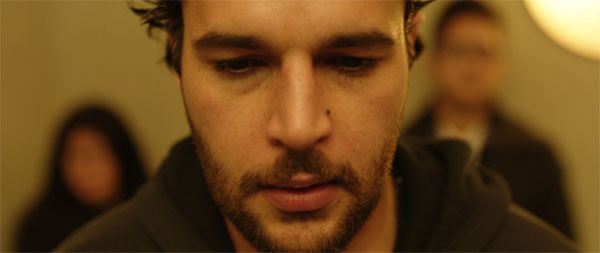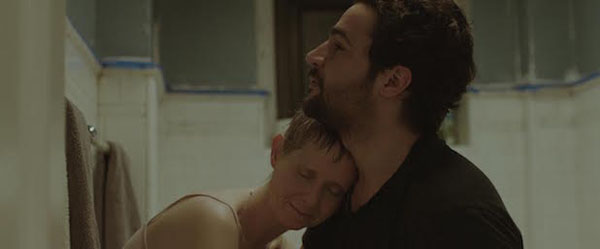“Christopher Abbott bailed on playing the doormat boyfriend to Allison Williams’s Marnie after season two of Girls,” begins David Rooney in the Hollywood Reporter. Watching his bruised, bristling performance as the rudderless title character in James White, it’s natural to assume that choice was dictated by the actor’s hunger for a darker exploration of his considerable range. The opportunity is provided in this extraordinarily intimate drama, which marks an arresting feature debut for writer-director Josh Mond of Borderline Films, the New York-based indie production collective behind such projects as Martha Marcy May Marlene and Simon Killer.”
“The sudden loss of one parent and the looming death of another set the stage,” explains Variety‘s Scott Foundas. “Familiar in its general trajectory, but unusually raw and ragged in its emotional architecture, Mond’s fraught portrait of a mother and son in crisis sports a pair of knockout performances by Cynthia Nixon and [Abbott], and a vivid feel for wayward New York youths cocooned by upper-middle-class privilege, but little in the way of redemptive creature comforts.”
“With its upscale interiors, reasonably well-heeled characters (including an inordinately low-key gay best friend) and a leading man who just wants to write, this has all the hallmarks of a traditional white-collar indie, of the kind that pour into film festivals by the dozen,” writes Damon Wise for the Guardian. “But when Abbot and Nixon start their sparring, Mond’s film takes on a magnificently physical and tactile quality, as Gail becomes frail and incapable in her son’s powerful arms. Other actors would have milked the dramatic opportunities here for all they were worth, but Nixon and Abbott—the latter glimpsed briefly in A Most Violent Year—keep their sights on the heartbreaking inevitability of the situation. Mond meanwhile, though is film is far from mainstream, stops short of being precious with his first-person style. Luckily these people found each other, and at this early stage their film is one of the standouts in this year’s Sundance selection.”
This is “not the kind of movie that someone pulls out of thin air, and anyone who sees it will correctly assume that Mond is pulling from his past,” writes David Ehrlich at Little White Lies. “James is a tough kid, but Abbott sells him on his weaknesses, his every inflection ballooning with the puffed up strength of someone who doesn’t want you to know where he grew up, or whom he might be afraid of losing. The movie is at its best when it’s chipping away at that steely veneer, and few films have so lucidly conveyed how hard it can be to convey unconditional love without a crisis to serve as a clear conduit for it.”
Cinematographer Matyas Erdely’s “fluid camerawork, which often floats so close to Abbott’s head it threatens to mow him down, suggests the Dardenne brothers on speed, but the cryptic aspect of his struggle feels closer to Michael Haneke,” suggests Indiewire‘s Eric Kohn.
At the Playlist, Rodrigo Perez praises the “strong supporting cast”—Ron Livingston, “a magazine editor and family friend sympathetic to White’s plight. A surprisingly good rapper/actor Scott ‘Kid Cudi’ Mescudi plays White’s best friend (refreshingly, he just happens to be a black gay man, with no other qualifiers to his identity needed) and the drama also stars David Call (Tiny Furniture, Smash), and Mackenzie Leigh (The Good Wife, Deception).”
Updates, 1/25: “This is a magnificently acted and nuanced character-sketch, often funnier and more nail-biting than the subject matter suggests,” writes Noel Murray at the Dissolve. “Both Mond and Abbott have such a rich understanding of James, a man who in an at-times-appalling way is using his pile-up of life crises as an excuse to be just the kind of selfish, lazy asshole he’d be on an ordinary day.”
“While lesser, perhaps more commercial films might shy away from the actual process of decay and loss, Mond displays no fear in vividly walking us through the bleak events in James White’s journey,” writes Jordan Raup at the Film Stage. “Some of his moments of unabashed anger may come across as overwrought and pre-calculated, but Mond’s raw, unflinching approach goes to great lengths to provide a tangible reason for our lead’s internal struggle.”
Sam Fragoso talks with Abbott for RogerEbert.com.
Updates, 1/31: “James White looks like a simple film on its surface,” writes Bilge Ebiri at Vulture. “But despite the vérité-influenced stylization, writer-director Mond doesn’t seem too interested in realism or grit. The film is regularly punctuated with shots of James waking up, often to find his world slightly different, as if each new day were a different layer in this unending dream.”
For Mike D’Angelo at the Dissolve, “this is one of those movies that doesn’t so much end as just stop, with a banal final shot that conveys little more than ‘so that happened.’ While it was actually happening, though, I was totally involved, and that counts for a great deal.”
Indiewire‘s Nigel M. Smith talks with Nixon while Ioncinema‘s Eric Lavallee talks with producers Antonio Campos and Sean Durkin.
Update, 2/1: “Abbott is simply phenomenal here, never overplaying White’s demons to the degree that other actors would have with the same material,” writes Brian Tallerico at RogerEbert.com. “Alcoholic, troubled twenty-somethings can be catnip for actors eager to over-act, and then you add in the melodrama of a parent dying of cancer? Think of all the places this performance could have gone wrong. Abbott misses every trap.”
Update, 2/23: Emma Myers interviews Mond for the L.
Update, 11/11: “Unlike the previous Borderline productions, James White never feels like it’s building toward a rug-pulling revelation or an ambiguous finale meant to haunt the viewer,” writes Danny King at Reverse Shot. “The movie is just this: a slow decline toward a new reality in which James White will have to do some reevaluating.”
Updates, 11/12: “Unyielding in its focus, James White burrows tightly into its title character’s fractured headspace, its camera pursuing a myopic visual style that at times recalls Philippe Grandrieux’s stifling macro compositions,” writes Jesse Cataldo at Slant. “What’s unexpected is the coarse intensity of this potentially familiar character study, the complete sincerity accorded to James White’s pained parade of self-destruction, and the open-ended nature of the film’s interrogation. The portrait that emerges is refreshingly frank and tactile, less a calculating introduction to one unstable youth than an intensely pitched mystery over what kind of person he’ll ultimately become.”
Slate‘s Dana Stevens: “In a more conventional, less rigorous telling of this story, James’s coming of age and Gail’s departure from this world would keep pace with one another, and mother and son would overcome their differences in a weepy deathbed reconciliation. Instead, James White ends on a note of irresolution so pronounced in its ambiguity that the first screen of credits comes as a genuine surprise: It’s over? Already? But a late scene in which James stays up all night with his half-delirious mother, helping her to the bathroom as he comforts her with a description of the long happy life they could have had together, has an emotional clarity and dramatic straightforwardness the rest of this delicately moody film sometimes lacks.”
“I first got to see it in a 1500-seat theater in Deauville, France, at a festival where my film, Krisha, was competing against it,” writes Trey Edward Shults at the Talkhouse Film. “It’s a film that broke my heart a couple of times, and I realized that I didn’t need to have any stupid imaginary competition with it.”
Four out of four stars from Brian Tallerico at RogerEbert.com, where he warns that his review “discusses a few scenes in detail that could be considered spoilers.”
Elise Nakhnikian talks with Abbott for Slant.
Listening (24’43”). Indiewire editor Dana Harris talks with Mond, Abbott and Nixon.
Updates, 11/14: “James White’s title character is an entitled, self-centered asshole,” grants Noel Murray at the AV Club. “But the movie about him is still a marvel: an honest, moving, and occasionally even funny portrait of what happens when a cripplingly immature young man gets hit with one reality check after another.”
Mond “has developed his own style, very different from that of either of his partners at Borderline Films, Antonio Campos and Sean Durkin,” writes Howard Feinstein for Filmmaker. “The jury’s in: He’s an emerged talent. In addition, he gets points for overcoming the emotional drain that necessarily accompanies a semi-autobiographical film about personal tragedy.”
Update, 11/29: “Despite its bleak melodrama, the film does flirt with the idea of James getting his act together,” notes Glenn Heath Jr. in the San Diego CityBeat. “The magnitude of its final scenes just might shake this foreboding character to his core. Whether or not you believe this will happen says a lot about your own outlook on life.”
Update, 12/1: “I do not see James White as a movie about a self-destructive, self-centered, rich-ish 20-something who needs to grow up,” writes Marilyn Ferdinand. “The character of James White is not the problem that needs figuring out in this film.”
Update, 12/27: “Mond isn’t interested in mining for our tears or using James as easy bait for empathy,” writes Ty Landis at In Review Online, “but the achievement is met anyway.”
The Sundance 2015 Index. For news and tips throughout the day every day, follow @KeyframeDaily. Get Keyframe Daily in your inbox by signing in at fandor.com/daily.





